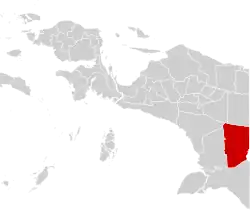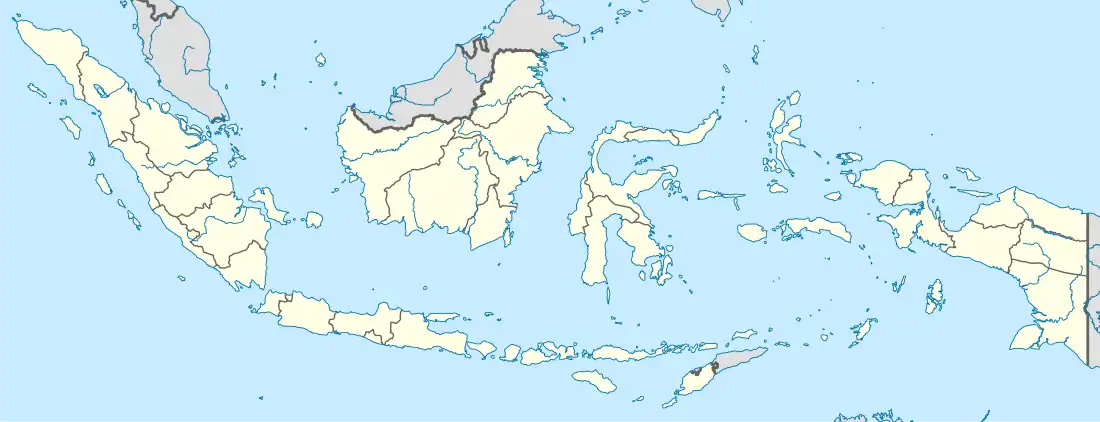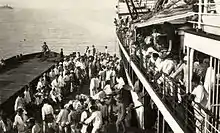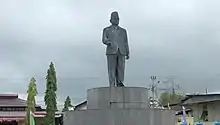Boven Digoel Regency
Boven Digoel Regency is an inland regency (kabupaten) in the northeastern part of the Indonesian province of South Papua. It was split off from Merauke Regency (of which it used to be a part) on 12 November 2002. It is bordered to the south by the residual Merauke Regency, to the west by Mappi Regency, and to the north by the province of Highland Papua, while to the east lies the international border with Papua New Guinea.
Boven Digoel Regency
Kabupaten Boven Digoel | |
|---|---|
 Coat of arms | |
| Motto(s): Nup Bagen Ngup Bagenep (I Am Because You Are) | |
 | |
 Boven Digoel Regency Location in Western New Guinea and Indonesia  Boven Digoel Regency Boven Digoel Regency (Indonesia) | |
| Coordinates: 5.7400°S 140.3482°E | |
| Country | |
| Province | South Papua |
| Regency seat | Tanah Merah |
| Government | |
| • Regent | Vacant |
| • Vice Regent | Chaerul Anwar |
| Area | |
| • Total | 27,108.29 km2 (10,466.57 sq mi) |
| Population (mid 2022 estimate)[1] | |
| • Total | 65,193 |
| • Density | 2.4/km2 (6.2/sq mi) |
| Time zone | UTC+9 (Indonesia Eastern Time) |
| Area code | (+62) 975 |
| Website | bovendigoelkab.go.id |
The regency covers an area of 27,108.29 km2 (10,466.57 sq mi), and the total population was 55,784 at the 2010 Census[2] and 64,285 at the 2020 Census;[3] the official estimate as at mid 2022 was 65,193.[1] The administrative centre is the town of Tanah Merah (or Persatuan kampung) in Mandobo District.
Administrative districts
The regency comprises twenty districts (distrik), tabulated below with their areas and their populations at the 2010 Census[2] and the 2020 Census,[3] together with the official estimates as at mid 2022.[1] The table also includes the locations of the district administrative centres, the number of administrative villages (kampung) in each district, and its post code.
| Name of District (distrik) | Area in km2 | Pop'n 2010 Census | Pop'n 2020 Census | Pop'n mid 2022 Estimate | Admin centre | No. of villages | Post code |
|---|---|---|---|---|---|---|---|
| Jair | 3,061.73 | 17,482 | 18,179 | 18,186 | Getentiri | 5 | 99651 |
| Subur | 2,660.09 | 1,224 | 1,470 | 1,511 | Subur | 5 | 99653 |
| Ki | 2,050.60 | 1,701 | 1,729 | 1,734 | Ujung Kia | 4 | 99652 |
| Mindiptana | 448.17 | 3,622 | 3,799 | 3,847 | Mindiptana | 13 | 99663 |
| Iniyandit | 379.65 | 833 | 1,006 | 1,036 | Langgoan | 5 | 99661 |
| Kombut | 660.93 | 691 | 1,135 | 1,239 | Kombut | 4 | 99662 |
| Sesnukt | 1,306.63 | 2,102 | 918 | 920 | Sesnukt | 5 | 99664 |
| Mandobo | 2,699.51 | 12,840 | 20,027 | 20,288 | Tanah Merah | 5 | 99674 |
| Fofi | 2,466.70 | 1,987 | 2,690 | 2,831 | Makmur/Ikisi | 8 | 99673 |
| Arimop | 1,311.77 | 1,270 | 1,631 | 1,698 | Maju | 7 | 99671 |
| Kouh | 467.25 | 1,186 | 1,093 | 1,095 | Kouh | 3 | 99655 |
| Bomakia | 1,082.95 | 2,196 | 2,475 | 2,514 | Bomakia | 5 | 99672 |
| Firiwage | 1,219.97 | 1,088 | 845 | 855 | Firiwage | 4 | 99691 |
| Manggelum | 1,289.65 | 1,188 | 836 | 855 | Manggelum | 6 | 99692 |
| Yaniruma | 1,611.04 | 866 | 1,025 | 1,052 | Yaniruma | 3 | 99685 |
| Kawagit | 904.23 | 1,001 | 1,139 | 1,160 | Kawagit | 6 | 99654 |
| Kombay | 830.91 | 1,263 | 1,028 | 1,030 | Wanggemalo | 5 | 99682 |
| Waropko | 1,086.97 | 1,910 | 1,993 | 2,019 | Waropko | 9 | 99684 |
| Ambatkwi | 1,282.38 | 743 | 449 | 474 | Kuken | 5 | 99681 |
| Ninati | 287.07 | 591 | 818 | 849 | Ninati | 5 | 99683 |
| Totals | 27,108.29 | 55,784 | 64,285 | 65,193 | Tanah Merah | 112 |
History

In the Dutch East Indies era, the present Boven Digoel Regency was known as Digul Atas (Upper Digul), located on the banks of the Digul River.
Boven-Digoel was a Dutch prison camp in the Dutch East Indies at the headwaters of the Digul River, where Indonesian nationalists and communists were interned between 1928 and 1942. Initially set to accommodate prisoners of the 1926 revolt led by the Communist Party of Indonesia, Boven-Digoel later was used as an exile for the national movement figures with a recorded number of prisoners of 1,308 people. Among the figures who had been exiled there were Mohammad Hatta, Sutan Syahrir, Sayuti Melik, and Marco Kartodikromo.

When the Pacific War broke out and Japan occupied Indonesia, Boven-Digoel prisoners were evacuated by the Dutch to Australia. The transfer was based on concerns that the prisoners would rebel if they remained at Boven-Digoel. It was hoped that the Indonesians brought to Australia would help the Dutch. It turned out that these political prisoners influenced the Australian trade union to boycott the Dutch ships that landed in the country. After the Allies succeeded in winning, the prisoners were returned to their original places in Indonesia.
The camp was reused to imprison Indonesian nationalists from Papua during West New Guinea dispute such as J.A. Dimara, Petrus Korwa and Hanoch Rumbrar.[4][5]
References
- Badan Pusat Statistik, Jakarta, 2023, Kabupaten Boven Digoel Dalam Angka 2023 (Katalog-BPS 1102001.9302)
- Biro Pusat Statistik, Jakarta, 2011.
- Badan Pusat Statistik, Jakarta, 2021.
- Materay, Bernarda; Wabisay, Yan Dirk (2020-07-01). "PERTUMBUHAN NASIONALISME INDONESIA DI KALANGAN ORANG PAPUA 1963--1969 GROWTH OF INDONESIA NATIONALISM AMONG THE PAPUANS 1963--1969". Masyarakat Indonesia. 45 (1): 1–18. doi:10.14203/jmi.v45i1.883. ISSN 2502-5694. Retrieved 2022-06-25.
- Sitompul, Martin (2020-12-03). "Mengenal 5 Pahlawan Nasional Asal Papua". Historia (in Indonesian). Retrieved 2022-01-16.
